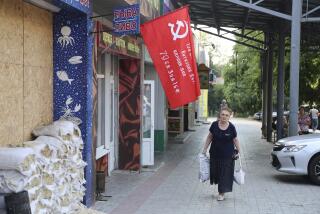Mostar Refugees Return to Cast Ballots
- Share via
MOSTAR, Bosnia-Herzegovina — Safet and Zijo Hadzijic, two scared brothers who fled this divided city three years ago, returned home Sunday to vote in the first free elections in Bosnia since war swept the country in 1992.
It took the two Muslim men 15 hours on a crowded bus to get here from the Adriatic coast of Croatia, where they have been living with their elderly mother in a one-room apartment since being released from a Bosnian Croat camp at the height of the war.
Zijo, 29, came home empty-handed, his glistening blue eyes recording the scene around him with the sad gaze of an orphaned puppy. His older brother carried a pink plastic bag stuffed with an inexpensive camera. When Safet got near the family apartment, now deep in a Croatian neighborhood, he snapped a few frames of someone else’s laundry hanging on the balcony.
“I can’t leave without some souvenir of the place where I lived for more than 30 years,” said Safet, 36, a refrigeration mechanic before the war who now works odd jobs digging ditches in Croatia. “I live for the day when I can come back for good.”
Hundreds of refugees, some from as far away as Austria and Britain, joined tens of thousands of other Mostar residents in what European Union officials described as an “unexpectedly pleasant and trouble-free” election day in this southern Bosnian city where ethnic divisions between Croats and Muslims are deep.
The tally here, coming after two years of tense international mediation by the European Union, was being carefully watched as a trial run for national elections in Bosnia-Herzegovina scheduled for Sept. 14. It was also seen as a vital test of the governing Muslim-Croat federation, a keystone to last year’s peace accord but a mostly unfriendly alliance here.
Although some voters who crossed ethnic lines reported beatings and harassment, the election was without the kind of violence officials had prepared for. More than 2,500 North Atlantic Treaty Organization troops were deployed for the vote, with armored personnel carriers parked at most busy intersections. Dozens of international police officers patrolled the streets, and buses crossing the Neretva River--the dividing line between east (Muslim) and west (Croat) Mostar--were escorted by local authorities from both sides.
“We have had 30 buses going back and forth all day, which is probably more movement than we’ve ever had,” said Antonijo Vujica, a Bosnian Croat police inspector. “The number of problems have really been minimal.”
Most complaints were technical, but potentially serious nonetheless. Hundreds of voters were turned away from polling places because their names were mistakenly left off registration lists. Nearly 100,000 people were eligible to vote, but because of an unexplained error, many names appeared only on the master list of voters at the central election headquarters. Fortunately, European Union officials said, the glitch seemed to have affected both sides.
Under a complex set of negotiated rules, the new city council must consist of 16 Croats, 16 Muslims and five “others”; six smaller borough councils also have mandated ethnic compositions.
Even with such formula-driven democracy, the Hadzijic brothers said it was essential to make the journey, even if it was only for an afternoon. “We came to vote for a unified Mostar,” Zijo said. “Before the war, it didn’t matter whether you were Muslim, Croat or Serb. We want it to be that way again.”
More to Read
Sign up for Essential California
The most important California stories and recommendations in your inbox every morning.
You may occasionally receive promotional content from the Los Angeles Times.













